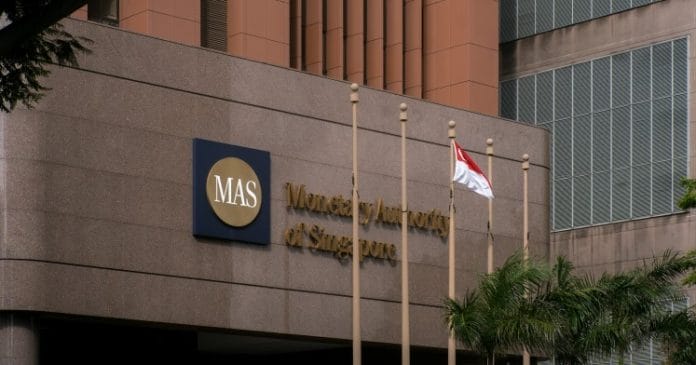Maybank Research Pte Ltd expects the Monetary Authority of Singapore (MAS) to maintain the current Singapore dollar appreciation stance, with no change to the midpoint or width of the policy band at the April meeting.
Maybank Research, in its Singapore Economics note today (Mar 28), thinks MAS will ease policy only in October at the earliest, via a gentler slope. The MAS quarterly monetary policy decision will be released by 12 April 2024.
There is no rush to relax monetary policy at this juncture, given an export-driven economic recovery and still-elevated inflation. The MAS views current monetary settings as appropriate to guide core inflation down to 2% by early 2025. Maybank Research’s model suggests that the Singapore dollar is trading at the upper half of the band, about 1.9% above the mid-point.
Trade-Related Sectors to Strengthen, Consumer-Facing Sectors to Moderate in 2024
Maybank Research forecasts GDP growth of +2.2% in 2024, slightly higher than the midpoint of the Singapore government’s 1%-3% forecast (Table 2). Flash estimates of 1Q GDP growth will likely come in at around +2.5%, up from +2.2% in 4Q 2023.
Manufacturing and trade-related sectors will recover from the deep export slump in 2023, driven by an electronics-led rebound in external demand.
In volume terms, non-oil domestic exports (NODX) grew by a robust +11.2% in the Jan-Feb period from a year ago, while manufacturing production rebounded +2.1%. Container throughput at local ports jumped +14.2% in Jan-Feb, while sea cargo handled increased by +8.3%.
Easing interest rates and the economic recovery will support more upbeat activity in the finance & insurance sector. As the Fed begins to ease interest rates in 2H 2024, Maybank Research projects Singapore’s 3-month SORA interest rate to decline to 3.15% by end-2024 from its current level of around 3.6%.
January’s decline in total outstanding loans (-1.5%) was the smallest since October 2022. The fall in loans to resident businesses narrowed to -2.8% in Jan (vs. -3.9% in Dec), due to financial & insurance, transport & storage and manufacturing. Consumer loans to residents reverted to positive growth (+0.4%) for the first time since Dec 2022.
In contrast, consumer-facing sectors including retail trade, food & beverages (F&B) and accommodation are grappling with fizzling revenge spending, while elevated inflation is prompting some households to tighten their belts.
The strong Singapore dollar is encouraging locals to divert their spending budgets abroad. In value terms, retail sales (-2.1%) fell for the second straight month in January when motor vehicles are excluded (which are supported by higher COE supply). Food & beverage services spending (-5.6%) declined for the first time since February 2022, led by a -16% plunge in restaurant spending. The Jan-Feb average will paint a more reliable picture of consumer spending, given that the Lunar New Year was in January last year (vs. Feb this year).
Nonetheless, hospitality and F&B will be cushioned by the robust recovery in tourist arrivals, led by a surge in China tourists after a 30-day mutual visa exemption took effect on 9 Feb, as well as the Taylor Swift concerts in March. Visitor arrivals jumped +50% YoY to 95.8% of pre-pandemic levels (1.4mn) in Feb, with Chinese visitors just -4% below Feb 2019 levels. More than 60% of the over 350,000 concertgoers likely came from abroad.
Construction will continue to expand at a robust pace as it normalises towards pre pandemic levels, supported by a strong pipeline of public and private sector projects. Key examples include the Built-to-Order HDB flats, Cross Island MRT line, and expansion of the two Integrated Resorts. The construction sector remains – 4.6% below pre-pandemic (4Q19) levels, as of 4Q 2023.
Core Inflation to Remain Sticky in First Half of 2024
Core and headline inflation are expected to remain above pre-pandemic norms in 2024, averaging +2.8% and +3% respectively (vs. +4.2% and +4.8% in 2023). Sustained Singapore dollar appreciation and global goods disinflation due to falling China producer prices have contributed to easing external price pressures. Global prices for most food commodities have continued to decline, with the UN FAO Food Price Index falling by -10.5% in February from a year ago.
Core inflation will likely remain sticky near current levels in the first half of the year. For Jan-Feb, core inflation averaged +3.4%, slightly higher than the +3.3% in 4Q 2023.
Hikes to GST, carbon taxes, property taxes and other administrative prices including electricity, gas, water and public transport are increasing consumer prices. Businesses will likely continue passing accumulated costs to consumer prices, although cooling consumer demand may limit the magnitude of price hikes for discretionary products.
Businesses are facing higher manpower, fuel, electricity, water, freight, rents and pass-through costs from suppliers. Some of these added expenses have been driven by policy changes and government tariff hikes.
For instance, the fivefold hike in carbon tax rates on 1 Jan and upcoming +7.3% hike to potable water prices1(20 cents per cubic m) in April is raising utility bills. The labour market remains tight, with job vacancies cooling but still significantly above pre-pandemic levels.
Wage cost pressures are being compounded by administrative wage adjustments, including higher S-Pass and Employment Pass qualifying salaries, CPF contributions and rollout of the Progressive Wage Model.
Headline inflation will be falling and diverging from core inflation, driven by the fall in COE prices (due to the bringing forward of COEs from peak years).
Accommodation inflation will also cool, with significant residential supply coming on-stream. The vacancy rate for residential property has risen to 8.1% at the end of 4Q 2023 (vs. 5.5% in end-4Q 2022).









